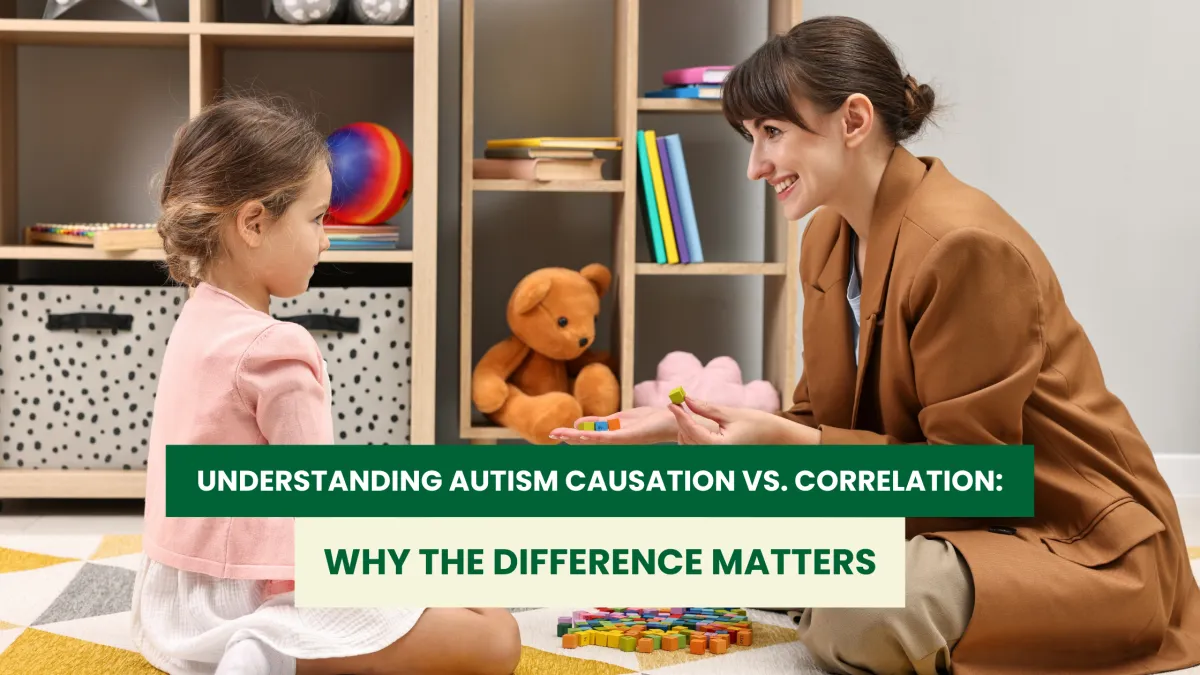
Autism Causation vs. Correlation: What Parents and Professionals Need to Know
Autism Causation vs. Correlation: What Parents and Professionals Need to Know
Why does this distinction matter so much?
Confusion around autism causation vs. correlation has left many parents feeling guilty and overwhelmed. Headlines often suggest that something they did — like taking Tylenol during pregnancy — directly caused autism. But the truth is, science is more complex. By understanding the difference between correlation and causation, parents can stop carrying misplaced blame and start viewing research with clarity.
What does correlation mean?
Correlation means two things appear together, but one doesn’t necessarily cause the other. For example:
Ice cream sales rise in summer.
Sunburn cases also rise in summer.
Are ice cream cones causing sunburns? Of course not. The real factor is the hot weather.
In the same way, when studies show a link between medication use during pregnancy and autism, they’re often describing a correlation — not causation.
What does causation mean?
Scientists themselves are urging caution in interpretation, not certainty.Causation means one thing directly leads to another. Smoking causes lung cancer. Lack of oxygen causes brain damage. These are established causal relationships backed by strong scientific evidence.
For autism, researchers would need to show that a factor like medication use directly increases autism risk, supported by biological mechanisms, replicated studies, and controlled experiments. At this stage, most studies do not prove causation — they only highlight associations.
Autism causation vs. correlation in the Tylenol debate
When it comes to autism causation vs. correlation and Tylenol, the evidence is mixed.
Some large observational studies found that children exposed to Tylenol in the womb had higher rates of autism or ADHD diagnoses.
Other studies, especially sibling comparison research, found the risk disappears when genetic and environmental factors are considered.
Confounding factors like fever, infection, or stress during pregnancy may explain why Tylenol was used in the first place, which complicates the data.
That’s why regulators like the FDA updated Tylenol labels to mention a possible association — not causation. You can watch a full breakdown of this debate here.
Why headlines mislead parents
Media outlets rarely say “possible correlation.” They say “causes.” Fearful headlines attract clicks — but they also leave parents feeling at fault. By misunderstanding autism causation vs. correlation, families often internalize blame for something they couldn’t control.
But the research doesn’t justify that level of certainty or guilt.
How to interpret research responsibly
When you see a study shared in the news, pause and ask:
Does the study show correlation, or actual causation?
Were genetic and environmental factors accounted for?
Do other studies confirm the same results, or are findings inconsistent?
Did regulators emphasize uncertainty, or did the media exaggerate?
Asking these questions helps you understand whether a study truly points to causation — or just correlation.
Why this distinction brings relief
Recognizing the difference between autism causation vs. correlation does more than improve science literacy — it frees parents from unnecessary guilt.
Autism is influenced by many factors: genetics, brain development, environmental influences, and chance. No credible research suggests it stems from a single choice, like taking one medication. Understanding the distinction means you don’t have to shoulder blame for something the evidence does not prove.
FAQ
Q: What’s the difference between correlation and causation in autism research?
A: Correlation means two factors appear connected, but one may not cause the other. Causation means one factor directly leads to the other. Most autism research shows correlations, not proven causes.
Q: Did Tylenol during pregnancy cause autism?
A: No. Studies only show associations. Experts stress that causation is not established, which is why the FDA uses cautious language.
Q: Why do headlines say “cause” instead of “correlation”?
A: Because “cause” grabs attention. Unfortunately, this oversimplifies research and fuels parental guilt.
Q: How should parents interpret autism studies?
A: Always check whether findings show causation or correlation. Remember that autism has multiple influences, and no single action or medication explains it.
